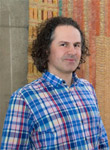Michael Nijhawan

Associate Professor
Office: Vari Hall, 2146
Phone: (416) 736-2100 Ext: 77994
Email: nijhawan@yorku.ca
I am a social anthropologist and cultural sociologist interested in the fields of transnational migration, religion, violence, trauma, health and medicine. My research agenda crosses the disciplines of anthropology, sociology, critical religious studies, Sikh Studies and Islam. I currently work on a SSHRC funded project on "Autoimmunity, Self, and Society: A Sociological Approach to Chronic Illness in the Wake of SARS-CoV-2." My prior research focused on the long-term effects of social, legal and political violence on Sikh and Ahmadi diaspora communities in Toronto and Frankfurt. I have been exploring how these communities negotiate experiences of both marginalization and resilience in the context of everyday lived religion. In this context I have introduced the concept of Precarious Diasporas as a conduit to explore the fragility, mutability and complexity of diaspora communities. For an overview: "Mapping Precarity and Politicisation in Punjabi Diasporas" Click Here
Degrees
Dr. Phil. Anthropology, University of HeidelbergM.A. Anthropology, Psychology, Education, University of Heidelberg
Appointments
Faculty of Graduate StudiesResearch Interests
- John O'Neill Award in Teaching - 2014
- John O'Neill Award in Teaching - 2012
- Research Fellow, Max Weber Institution for Advanced Social and Cultural Studies - 2013
- Deans Merit Awards - 2007, 2009, 2010, 2011, 2012
Approach to Teaching
In my understanding, teaching begins with the creation of an active learning environment in the classroom that is conducive to the development of academic skills and that fosters processes of learning through social interaction. Teaching has never unfolded in a social and political vacuum, particularly not in sociology. I am committed to a critical school of social theory in which learning in the classroom is oriented towards societal change and the intellectual and ethical flourishing of the person. Whatever course material I teach – be it on the undergraduate or graduate level – has components that speak directly to global societal issues that are salient to our times. As a sociologist and anthropologist, I am specifically sensitive to the diversity of thought and knowledge and so try to actively push students to step outside of their taken-for-granted frames of seeing the world.
I am a social anthropologist and cultural sociologist interested in the fields of transnational migration, religion, violence, trauma, health and medicine. My research agenda crosses the disciplines of anthropology, sociology, critical religious studies, Sikh Studies and Islam. I currently work on a SSHRC funded project on "Autoimmunity, Self, and Society: A Sociological Approach to Chronic Illness in the Wake of SARS-CoV-2." My prior research focused on the long-term effects of social, legal and political violence on Sikh and Ahmadi diaspora communities in Toronto and Frankfurt. I have been exploring how these communities negotiate experiences of both marginalization and resilience in the context of everyday lived religion. In this context I have introduced the concept of Precarious Diasporas as a conduit to explore the fragility, mutability and complexity of diaspora communities. For an overview: "Mapping Precarity and Politicisation in Punjabi Diasporas" Click Here
Degrees
Dr. Phil. Anthropology, University of HeidelbergM.A. Anthropology, Psychology, Education, University of Heidelberg
Appointments
Faculty of Graduate StudiesResearch Interests
Awards
- John O'Neill Award in Teaching - 2014
- John O'Neill Award in Teaching - 2012
- Research Fellow, Max Weber Institution for Advanced Social and Cultural Studies - 2013
- Deans Merit Awards - 2007, 2009, 2010, 2011, 2012
All Publications
Approach to Teaching
In my understanding, teaching begins with the creation of an active learning environment in the classroom that is conducive to the development of academic skills and that fosters processes of learning through social interaction. Teaching has never unfolded in a social and political vacuum, particularly not in sociology. I am committed to a critical school of social theory in which learning in the classroom is oriented towards societal change and the intellectual and ethical flourishing of the person. Whatever course material I teach – be it on the undergraduate or graduate level – has components that speak directly to global societal issues that are salient to our times. As a sociologist and anthropologist, I am specifically sensitive to the diversity of thought and knowledge and so try to actively push students to step outside of their taken-for-granted frames of seeing the world.

